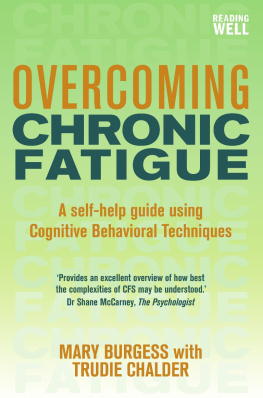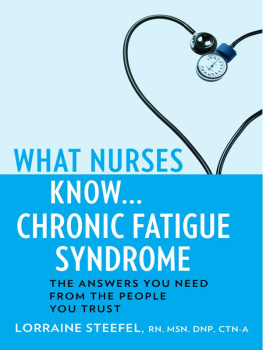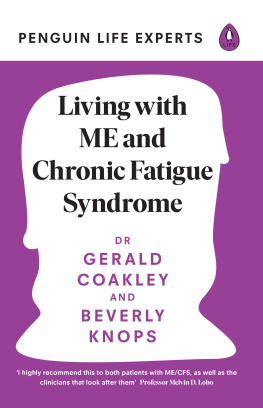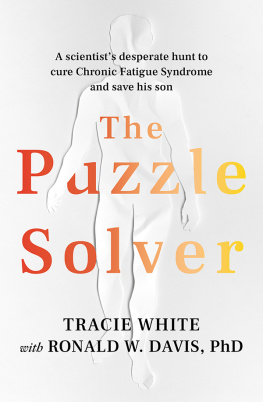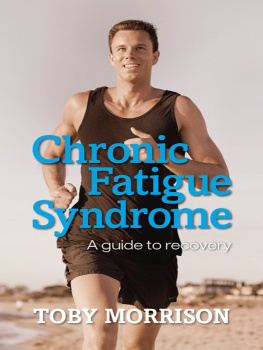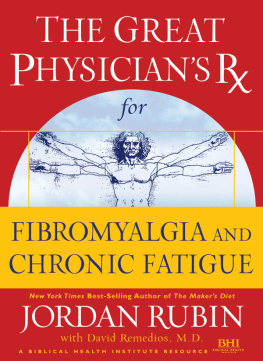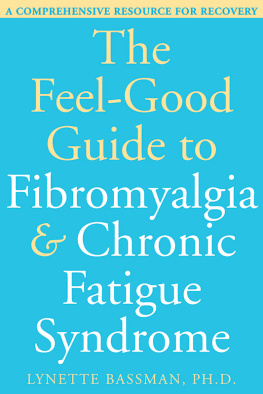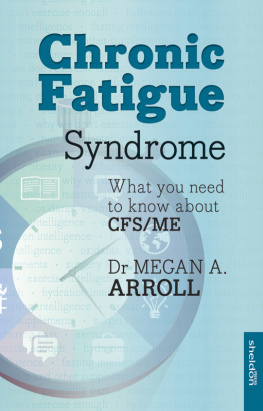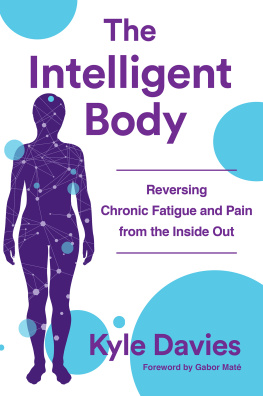Mary Burgess has worked as a Cognitive Behavioral Therapist in the area of chronic fatigue syndrome (CFS) for more than 15 years. In addition to her clinical work she has been engaged in research and development. This has mainly involved developing and evaluating forms of intervention for patients with CFS, who, for whatever reason, have experienced difficulty in getting to the hospital. With colleagues, this work has been published in academic journals and has led to the writing of this book.
A current research interest involves developing a homebased cognitive behavioral program for children who are severely disabled by symptoms of CFS.
Trudie Chalder is Professor of Cognitive Behavioural Psychotherapy at Kings College London. She has worked as a clinician and a researcher in the area of Chronic Fatigue Syndrome (CFS/ME) in adults and children for about 20 years. She developed the cognitive behavioral treatment of CFS and the approach has now been evaluated in a number of clinical research trials with positive results.
The aim of the Overcoming series is to enable people with a range of common problems and disorders to take control of their own recovery program. Each title, with its specially tailored program, is devised by a practicing clinician using the latest techniques of cognitive behavioral therapy techniques which have been shown to be highly effective in helping people overcome their problems by changing the way they feel about themselves and their difficulties. The series was initiated in 1993 by Peter Cooper, Professor of Psychology at Reading University and Research Fellow at the University of Cambridge in the UK, whose original book on overcoming bulimia nervosa and binge-eating continues to help many people in the UK the USA, Australasia and Europe.
Other titles in the series include:
OVERCOMING ANGER AND IRRITABILITY
OVERCOMING ANOREXIA NERVOSA
OVERCOMING ANXIETY
OVERCOMING BODY IMAGE PROBLEMS INCLUDING BODY DYSMORPHIC DISORDER
OVERCOMING BULIMIA NERVOSA AND BINGE-EATING
OVERCOMING CHILDHOOD TRAUMA
OVERCOMING CHRONIC PAIN
OVERCOMING COMPULSIVE GAMBLING
OVERCOMING DEPRESONALIZATION AND FEELINGS OF UNREALITY
OVERCOMING DEPRESSION
OVERCOMING GRIEF
OVERCOMING HEALTH ANXIETY
OVERCOMING INSOMNIA AND SLEEP PROBLEMS
OVERCOMING LOW SELF-ESTEEM
OVERCOMING MOOD SWINGS
OVERCOMING OBSESSIVE COMPULSIVE DISORDER
OVERCOMING PANIC
OVERCOMING PARANOID AND SUSPICIOUS THOUGHTS
OVERCOMING PROBLEM DRINKING
OVERCOMING RELATIONSHIP PROBLEMS
OVERCOMING SEXUAL PROBLEMS
OVERCOMING SOCIAL ANXIETY AND SHYNESS
OVERCOMING STRESS
OVERCOMING TRAUMATIC STRESS
OVERCOMING WEIGHT PROBLEMS
OVERCOMING WORRY
OVERCOMING YOUR CHILDS FEARS AND WORRIES
OVERCOMING YOUR CHILDS SHYNESS AND SOCIAL ANXIETY
OVERCOMING YOUR SMOKING HABIT
All titles in the series are available by mail order.
Please see the order form at the back of this book.
www.overcoming.co.uk
OVERCOMING
CHRONIC
FATIGUE
A self-help guide using
Cognitive Behavioral Techniques
MARY BURGESS
WITH
TRUDIE CHALDER
Robinson
LONDON
Mary
To Martin and my children: Emily, Rachel, Thomas and Anna
Trudie
To Mark
Constable & Robinson Ltd
3 The Lanchesters
162 Fulham Palace Road
London W6 9ER
www.constablerobinson.com
First published by Robinson Publishing Ltd, 2005
This edition published by Robinson, an imprint of Constable & Robinson Ltd, 2009
Copyright Mary Burgess and Trudie Chalder 2005, 2009
The right of Mary Burgess and Trudie Chalder to be identified as the authors of this work has been asserted by them in accordance with the Copyright, Designs and Patents Act 1988.
All rights reserved. This book is sold subject to the condition that it shall not, by way of trade or otherwise, be lent, re-sold, hired out or otherwise circulated in any form of binding or cover other than that in which it is published and without a similar condition including this condition being imposed on the subsequent purchaser.
A copy of the British Library Cataloguing in Publication data is available from the British Library
Important Note
This book is not intended as a substitute for medical advice or treatment. Any person with a condition requiring medical attention should consult a qualified medical practitioner or suitable therapist.
ISBN: 978-1-84901-132-7
Printed and bound in the EU
1 3 5 7 9 10 8 6 4 2
Table of contents
PART ONE: Understanding Chronic Fatigue Syndrome
PART TWO: Learning How To Cope
PART THREE: Making Further Progress
PART FOUR: How Others Can Help
Acknowledgments
This book has been developed over the course of many years and a huge number of people have contributed to this final product. We would like first to mention the considerable number of people with chronic fatigue syndrome who have used the techniques described in this book and have made suggestions on how our work could be improved. We would also like to thank all of our colleagues, past and present, who have commented on the text or who have given us feedback from their patients who have used the techniques.
The source of the physiological explanation for chronic fatigue syndrome and some of the information contained within the section on autonomic arousal in CFS came from an unpublished treatment manual written by Pauline Powell, a physiotherapist in Liverpool.
The chapter on overcoming unhelpful thinking patterns was influenced by work carried out by Christine Padesky and Dennis Greenberger; for more comprehensive explanations of the ideas contained within this chapter, we recommend that you refer to their book Mind over Mood (for details see Chapter 14, Useful resources).
A personal note from Mary Burgess: I would like to thank Trudie Chalder, with whom I have worked for the past ten years. Without her enthusiasm for finding ways to help people with chronic fatigue syndrome, this book might never have been written. Trudies extensive research and vast clinical experience have contributed not only to our understanding of chronic fatigue syndrome today but also to the development of techniques to help individuals overcome their problems.
Preface
Fatigue is central to many chronic and debilitating illnesses, including chronic fatigue syndrome, chronic pain, cancer, and chronic respiratory problems. However, fatigue is something that also occurs when we are overcommitted, working too hard, or making too little time for relaxation. Although this book has been specifically written for people suffering from chronic fatigue syndrome, many of the techniques will be useful for people who feel fatigued from other causes.
Our reasons for writing a self-help book for people with chronic fatigue syndrome were varied. First, we had carried out a small research study at Kings College Hospital, London, which indicated that some patients improved after using an earlier version of this self-help book with only phone calls from a therapist, rather than face-to-face consultations. Second, there are a number of people suffering from chronic fatigue syndrome who do not have access to a clinician with the expertise to help them to overcome their problems. Third, some people suffering from chronic fatigue syndrome continue to lead busy lives that make it difficult for them to attend regular appointments.
The overall aim of this book is to provide you with information and strategies to help you to overcome your fatigue and the restrictions on your life that result from it. The strategies have been shown to be effective in treating a wide range of illnesses, including chronic fatigue syndrome. However, although the help provided here may be enough to help you overcome your fatigue and associated problems, it may not be sufficient for everyone. For those, advice on where to get further help is offered.
Next page
